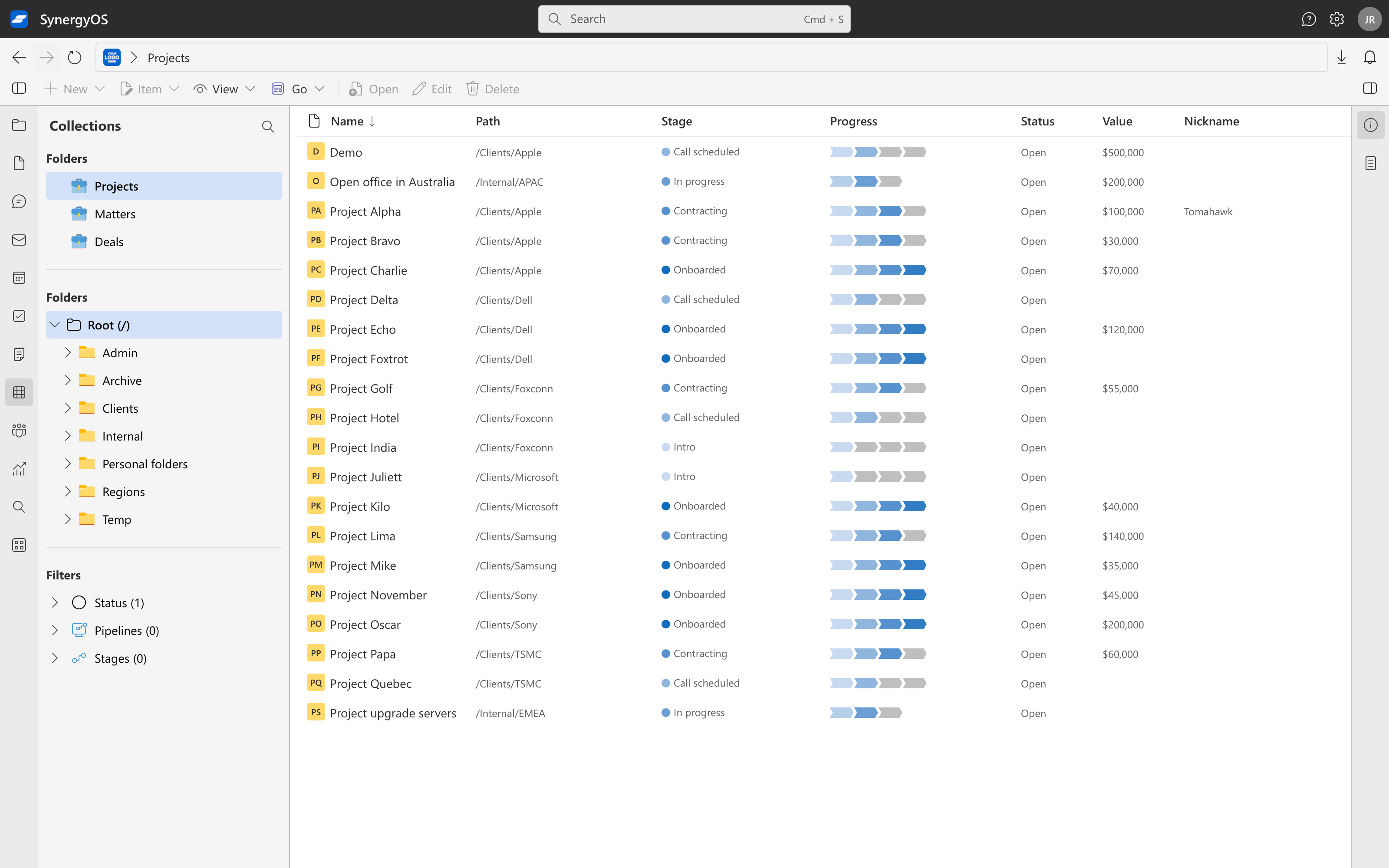Collections
1. What It Is
Collections let you define custom folder and item types in SynergyOS—beyond standard files, notes, and tasks. It gives teams a flexible way to manage structured data such as projects, contracts, tickets, or assets, all within the shared folder system.

2. Why It Matters
Many teams need more than generic files or tasks. You may want to:
- Track project stages with metadata and pipelines
- Manage CRM-style interactions like calls, tickets, or deals
- Organize structured data like contracts or assets
Collections give you this flexibility:
- Build folder types like Projects or Clients
- Create item types like Contracts or Support Tickets
- Add metadata, tags, and pipelines to control and report on structured work
It all works inside the same unified folder system, so everything—from rich text notes to structured data—lives in one place.
3. How to Use It
1. Default Project Type (Built-In)
SynergyOS includes a default folder type called “Project”, ready for immediate use:
- Use it to track initiatives with fields like
Client,Stage,Deadline,Owner - Add tasks, notes, files, and custom items under each project folder
This is ideal for project management or light CRM use cases.
2. Create Custom Folder Types
Admins can define additional folder types beyond “Project” to support other workflows:
- Examples: Clients, Assets, Departments
- Metadata fields can include
Region,Start Date,Owner, etc.
Use folder types to represent business units, clients, product lines, or any other high-level structure relevant to your organization.
3. Create Custom Item Types
Admins can also define new item types for structured records:
- Examples: Contract, Invoice, Case
- Each type can include fields like
Status,Amount,Assigned To, etc.
These items behave like files or notes inside folders but follow custom metadata rules.
4. Add Tags, Metadata, and Pipelines
- Tags: Add multiple tags to any folder or item for cross-cutting organization
- Metadata Inheritance: Items can inherit folder metadata (e.g., all tickets in a folder auto-inherit the client)
- Pipelines: Attach progress stages to folder or item types (e.g.,
Open → In Progress → Resolved)
5. Examples
CRM-Style Tracking with Notes and Custom Items
- Use Notes to log calls and meetings inside “Client” folders
- Add a custom item type like Interaction with fields:
Date,Type,Follow-up Required - Combine structured tracking (items) with free-form documentation (notes)
Contract Management
- Folder Type: “Clients”
- Item Type: “Contract” with metadata:
Value,Start Date,Expiration - Add notes for negotiations, link files, and track status via pipeline
Internal Ticketing System
- Folder Type: “Department” (e.g., IT)
- Item Type: “Support Ticket” with:
Priority,Status,Assigned To - Filter by tag, sort by urgency, and inherit department from folder
Asset Inventory
- Folder Type: “Assets”
- Metadata fields:
Serial Number,Assigned User,Purchase Date - Filter and search by metadata or tag (e.g.,
Laptop,Returned,Decommissioned)
4. FAQ
Can I use Collections without defining anything custom?
Yes. The default “Project” folder type is available by default, and all users can start there.
Can I still use notes, files, and tasks inside custom folders?
Absolutely. Collections extend the system—they don’t replace default types. A folder can mix files, notes, tasks, and structured items.
Do I need to be an admin to define new types?
Yes. Only admins can create or edit custom folder/item types and metadata fields.
How does metadata inheritance work?
Items inside a folder can inherit values from the folder itself (e.g., Client = ACME Inc.), reducing data entry and improving consistency.
Can I change metadata fields later?
Yes, but changes affect all existing items of that type, so coordinate with your team first.